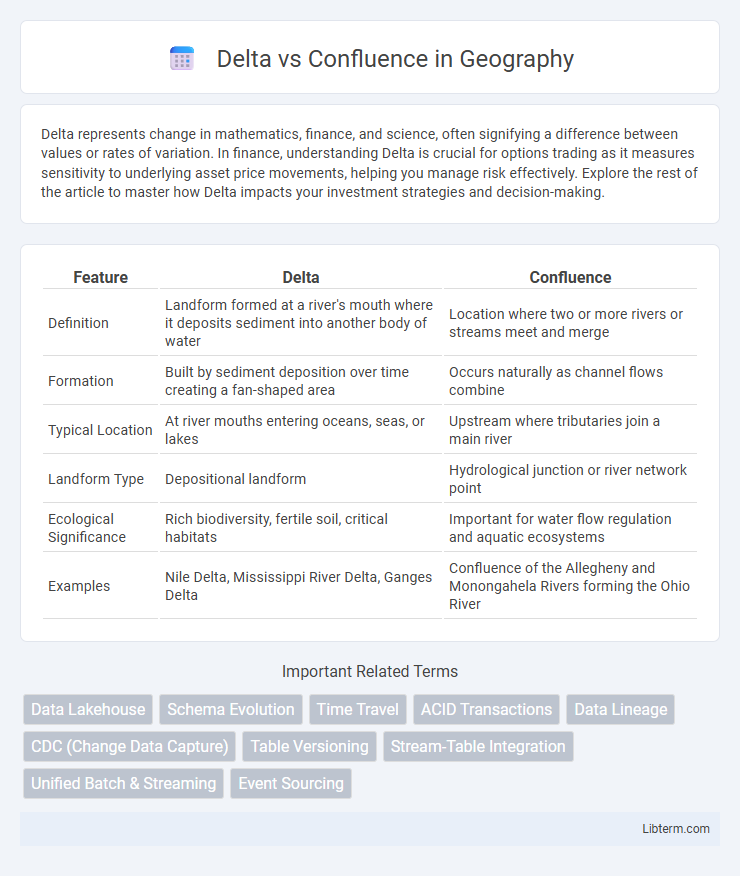Delta represents change in mathematics, finance, and science, often signifying a difference between values or rates of variation. In finance, understanding Delta is crucial for options trading as it measures sensitivity to underlying asset price movements, helping you manage risk effectively. Explore the rest of the article to master how Delta impacts your investment strategies and decision-making.
Table of Comparison
| Feature | Delta | Confluence |
|---|---|---|
| Definition | Landform formed at a river's mouth where it deposits sediment into another body of water | Location where two or more rivers or streams meet and merge |
| Formation | Built by sediment deposition over time creating a fan-shaped area | Occurs naturally as channel flows combine |
| Typical Location | At river mouths entering oceans, seas, or lakes | Upstream where tributaries join a main river |
| Landform Type | Depositional landform | Hydrological junction or river network point |
| Ecological Significance | Rich biodiversity, fertile soil, critical habitats | Important for water flow regulation and aquatic ecosystems |
| Examples | Nile Delta, Mississippi River Delta, Ganges Delta | Confluence of the Allegheny and Monongahela Rivers forming the Ohio River |
Introduction to Delta and Confluence
Delta is a powerful version control and collaboration tool designed for managing code changes and project workflows with real-time syncing and branching capabilities. Confluence, developed by Atlassian, serves as a comprehensive team collaboration platform focused on document management, knowledge sharing, and project documentation integration. Both platforms enhance team productivity but cater to distinct needs: Delta centers on code versioning, while Confluence excels in content collaboration and organizational knowledge management.
Core Features Overview
Delta offers advanced version control, robust branching, and real-time collaboration tailored for software development, supporting seamless integration with Git repositories. Confluence excels in content management with powerful documentation tools, team collaboration spaces, and comprehensive knowledge base capabilities designed for project transparency. While Delta prioritizes code management and developer workflows, Confluence emphasizes information organization and team communication within enterprise environments.
User Interface and Experience
Delta offers a streamlined, code-focused interface tailored for developers, emphasizing version control and seamless branching capabilities, which enhances productivity for collaborative coding projects. Confluence provides a more versatile interface designed for content creation and team collaboration, featuring customizable templates, rich text editing, and integration with Atlassian tools that enrich user experience in documentation and project management. Users benefit from Delta's minimalistic design prioritized for efficiency, while Confluence excels with its intuitive navigation and comprehensive content organization features.
Collaboration and Teamwork Capabilities
Delta enhances collaboration with real-time editing, seamless version control, and intuitive commenting features, enabling teams to synchronize efforts efficiently. Confluence offers robust teamwork capabilities through its integration with Jira, extensive plugin library, and structured content organization that supports project management workflows. Both platforms prioritize collaborative transparency but differ in their focus; Delta excels in live document co-authoring while Confluence emphasizes knowledge management and cross-team alignment.
Integration with Other Tools
Delta excels in seamless integration with popular development tools such as Jira, GitHub, and Slack, enabling streamlined workflows and real-time collaboration. Confluence offers robust integration within the Atlassian ecosystem, particularly with Jira and Trello, enhancing project documentation and task management synergy. Both platforms support API access for custom integrations, but Delta's broader compatibility with third-party tools often makes it more versatile for diverse tech stacks.
Security and Compliance
Delta offers robust security features with end-to-end encryption and granular access controls tailored for enterprise compliance standards like GDPR and HIPAA. Confluence provides comprehensive user permission settings and integrates with Atlassian Access for SAML SSO, enhancing security in regulated environments. Both platforms support audit logs and data residency options, ensuring organizations meet strict compliance and governance requirements efficiently.
Customization and Scalability
Delta offers advanced customization options with flexible scripting and template integration, allowing teams to tailor workflows and interface elements to specific project needs. Confluence excels in scalability, supporting large enterprises with robust permission controls, extensive plugin marketplace, and seamless integration with Atlassian tools, ensuring it grows efficiently with expanding teams. While Delta provides granular control over customization, Confluence's strength lies in managing complex organizational structures and scaling collaborative documentation across multiple departments.
Pricing and Licensing Models
Delta offers a transparent subscription-based pricing model with tiered plans suited for small to large teams, typically priced per user per month, allowing scalable licensing options. Confluence employs a flexible pricing structure based on the number of users, featuring cloud and server deployment options with different licensing costs, including a free tier for small teams and enterprise plans with advanced support. Both platforms provide enterprise licensing with customizable agreements for large organizations, but Delta emphasizes straightforward pricing with no hidden fees.
Pros and Cons Comparison
Delta offers real-time collaborative editing with robust version control, making it ideal for teams needing precise document tracking and instant updates. Confluence excels in comprehensive project management integration and extensive plugin support, enhancing team collaboration across various business tools. While Delta prioritizes streamlined document editing and auditability, Confluence provides broader functionality but can be more complex to navigate and configure for new users.
Which Platform is Right for You?
Delta offers powerful version control and collaboration tools ideal for development teams seeking detailed change tracking and code review capabilities. Confluence excels in team knowledge management and documentation, providing robust wiki-style pages and integration with project management tools like Jira. Choose Delta if your priority is streamlined software development workflows; opt for Confluence to enhance project documentation and team communication.
Delta Infographic

 libterm.com
libterm.com